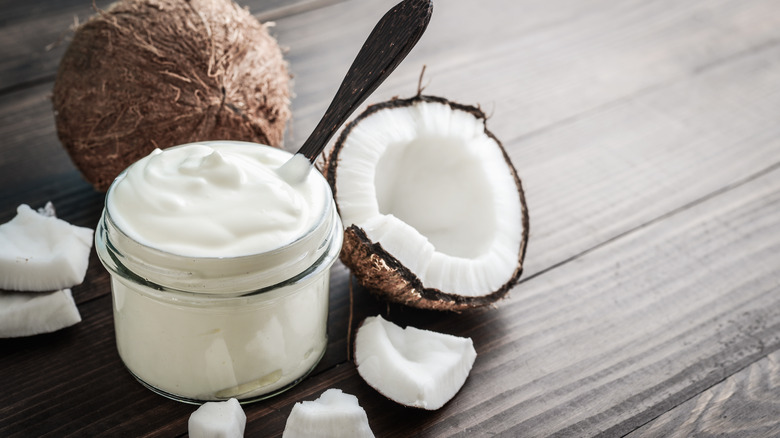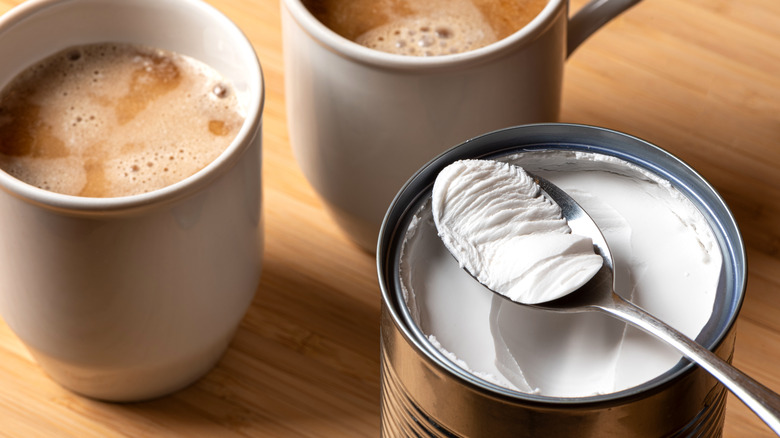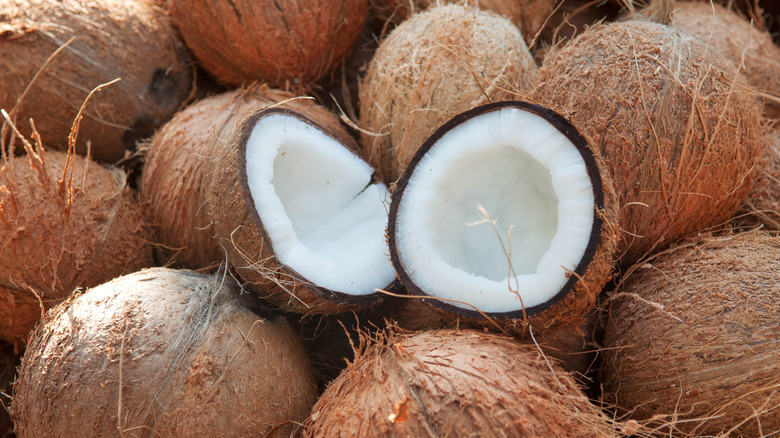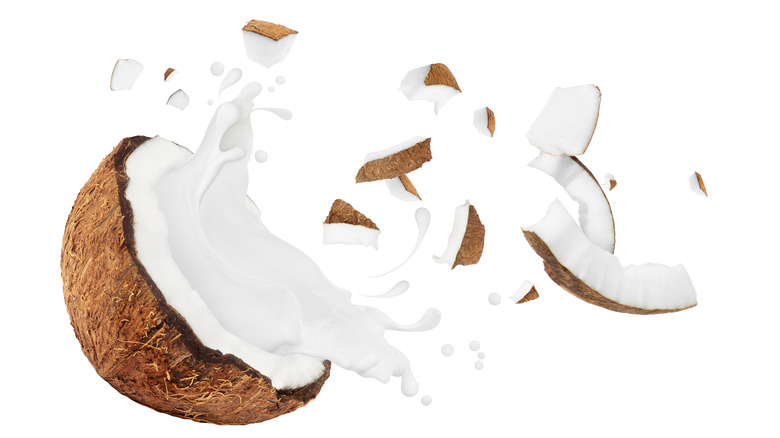Coconut Cream Vs. Coconut Milk: How Are They Different?
Both coconut milk and water add considerable heft, body, and flavor to any dish they're added to and are an excellent substitute for dairy milk and cream. When shopping at the grocery store, though, differentiating between the options and selecting the correct coconut product for your cooking project can be a real doozy. Here's a primer to outline exactly what each product is and how to use each one.
A staple in Southeast Asian cuisine, coconut milk and cream are both incredibly important ingredients. They are also a growing mainstay in vegan, paleo, and keto diets. In understanding the nuances of each, it's helpful to know what a coconut is. These round stone fruits have three layers (fruit, nut, and seed), which means it can provide a variety of different substances. Coconut water is an entirely different animal altogether, and it is the natural, pure juice that is released from a coconut once it is opened. Cream and milk, on the other hand, are created by a cooking and production process involving boiling the coconut flesh with water.
What is the difference between coconut milk and coconut cream?
The primary distinction between the two coconut products is their level of viscosity. Coconut cream is very rich and thick, while coconut milk is about the thickness of dairy milk. Coconut milk is made from one part shredded coconut to one part water, while coconut cream is made of four parts coconut shredded to 1 part water. The production process involves coconut blended or pureed with water and then strained. Some brands of coconut milk also added stabilizers, so the consistency can vary from brand to brand.
After opening a can of coconut milk, one will usually find a "ring" at the very top consisting of thick, creamy coconut cream. If this is removed or scooped aside, then there's a milky substance underneath. Most cans of coconut milk naturally come with this ring of coconut cream on top, but the creamier, thicker coconut product can also be purchased separately or individually. Some also add water to coconut cream in order to dilute it to make it more pourable and consistent with coconut milk. This "cream" is higher in fat and protein than the milk, according to Bon Appétit.
How do they differ from other canned and boxed coconut products?
Cream of coconut is another distinct option, which has been sweetened and essentially acts as a creamer or a whipped cream alternative. A standard use for this product is in piña coladas, so be mindful of this if you're cooking a savory dish! The flavor of both products is slightly salty, sweet, and tropical. Some also claim that coconut can have a nutty taste.
Coconut milk is an amazing addition to almost any braised dish, and both the milk and cream are excellent pantry staples to have on hand. There are also boxed, drinkable coconut milks, which are similar to items such as almond, oat, or soy milk. There is also "lite coconut milk," which is essentially a lower-fat coconut milk variation. Canned coconut milk is usually more suited for cooking and baking, whereas coconut milk in cartons is more pertinent for drinking, cereal, and more. When it comes to the majority of savory and sweet dishes, though, using full-fat is best.
What can you make with coconut products and are they healthy?
Coconut milk and cream are excellent additions to desserts such as bread puddings, breakfasts like oatmeal, and also deep, rich dishes like stews and curries and soups. Some also stir them into coffees or teas in place of dairy milk. Of course, they're also delicious in coconut cakes, pies, tarts, or cupcakes, and add a delicious flavor and consistency to ice creams, sorbets, and other frozen desserts. In terms of savory dishes, you can even make "creamed" veggies or mashed potatoes with coconut milk or substitute coconut milk in smoothies and much more. Coconut milk or cream is also the primary ingredient if you're looking to make an uber-delicious vegan ranch dressing.
In addition, coconut is very healthful and has an especially high source of potassium, according to Healthline. The site also notes that coconut water is also a great post-workout drink and preferable to most sports drinks as it's good for hydration. Coconut is an absolutely wonderful ingredient that is incredibly versatile, no matter which specific product you use. Just be sure to get the proper item in correspondence with whatever recipe you're planning to make — it's bound to be delicious!



